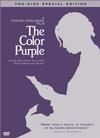The Migration of
the Story
Re: Telling the Story - The Color Purple
"I imagine good
teaching as a circle of earnest people sitting down to ask each
other meaningful questions. I don't see it as the handing down
of answers."
-Alice Walker
Theoretical considerations of adaptation
 When
first published in 1982, The Color Purple
received some harsh criticism for
what its detractors saw as a negative representation of African-American
folk culture. Even though some of this criticism was simply reiterated
upon the release of the adapted film version, new problems arose
which were unique to the new medium.
When
first published in 1982, The Color Purple
received some harsh criticism for
what its detractors saw as a negative representation of African-American
folk culture. Even though some of this criticism was simply reiterated
upon the release of the adapted film version, new problems arose
which were unique to the new medium.
Throughout the film industry's relatively short history, there
have been a large number of novels that have made the transition
from print to the big screen. While it appears as though the general
public doesn't concern itself with the issues surrounding adaptation,
a significant number of scholars do. Some critics claim that the
adaptation of the novel works against the uniqueness of the film.
In Take Two: Adapting the Contemporary American Novel to Film,
Alain Resnais is quoted as saying, "I think that the writer
has completely expressed himself in the novel . . . wanting to
make a film out if it is a little like re-heating a meal."
Joseph Heller is also quoted as saying "I can't think of
any film ever adapted from any work of literature that I or other
people feel has any quality to it that even approaches the original
work of literature that was its source."
Besides the distinction of high and low culture/art inherent in
discussions on popular culture, communications theorists have
also put forth analyses useful in understanding how a novel may
be pulled into another medium.
In Mieke Bal's Narratology: Introduction to the Theory of Narrative,
the author divides her book into three sections: Stories, Texts
and Fabulas. Bal also offers a basic definition for some of the
primary elements within the discussion of narrative. Bal's breakdown
is as follows:
- Text: a finite, structured whole composed of language signs
- Narrative Text: a text in which an agent relates a narrative
- Story: a fabula that is presented in a certain manner
- Fabula: a series of logically and chronologically related events that are caused or experienced by actors
- Event: the transition from on state to another state
- Actors: agents (not necessarily human) that perform actions
- To act: to cause or experience
an event
Return Home

|
Disclaimer © 2003 - 2004 by class of SOSC 4319 at York University |